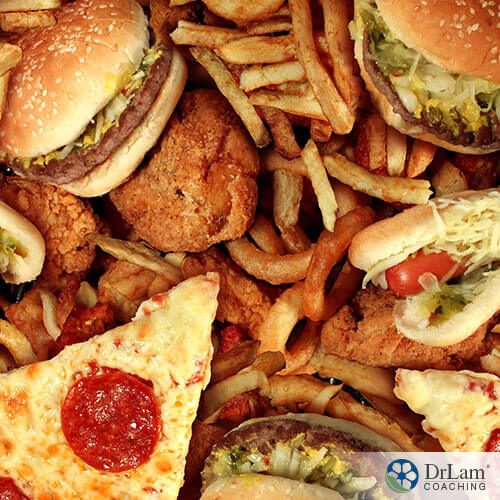 The trouble with junk food is that it's convenient, tasty, and cheap. When it first appeared in the 60s and 70s, it was welcomed as a sign of progress and post-war abundance. The idea was that by buying frozen, prepackaged, or canned foods, and by not having to spend so much time preparing meals, we would have more time to spend making money, engaging in hobbies, or spending quality time with our loved ones.
The trouble with junk food is that it's convenient, tasty, and cheap. When it first appeared in the 60s and 70s, it was welcomed as a sign of progress and post-war abundance. The idea was that by buying frozen, prepackaged, or canned foods, and by not having to spend so much time preparing meals, we would have more time to spend making money, engaging in hobbies, or spending quality time with our loved ones.
Thanks to the massive, awareness-raising campaigns, we now know that junk food is not only empty calories, but that most of the diseases of civilization, like stroke, heart disease, cancer, diabetes, autoimmune disorders, and obesity, are linked to a diet based on poor food choices.
What makes a food so bad for you we call it junk? Ingredients and preparation method.
Most of the foods we consider junk are prepared by deep-frying, boiling, and grilling. In the process, a lot of salt, sugar, and trans fats are added, partly to improve the taste, and partly to extend the shelf-life.
However, the taste, appearance, and packaging are not the only reasons junk food is so popular. Another reason is affordability. Eating healthy does cost more, about $500 per person per year, so for a big family, this way of eating may not be an option. In other words, if healthy foods cost less than junk food, many people would be happy to change their eating habits and start eating healthier. But this would be a major blow to big food chains, who have a lot of influence on policymaking, this scenario is unlikely.
What's particularly worrying about junk food's popularity is that marketing campaigns often target young adults who are at a stage of life when they will eat or do whatever happens to be “in”. Aggressive marketing strategies make it very clear that certain lifestyles and foods are cool, and that by buying such foods, you, too, will be cool. Young people are easy targets and are often abused. Of course, the ads don't mention that foods full of high levels of salt, sugar, and saturated fats also contain insufficient protein, vitamins, minerals, and amino acids.
A recent study revealed that junk food advertisements are directly linked to obesity in young people. Children and teenagers, much more than adults, are prone to be guided in their lifestyle choices by what they see advertised. According to this study, young people who watched a lot of food advertisements consumed many more calories in sugary, salty, and fatty foods than those who don't.
Although eliminating junk food from our lives is difficult, we should at least be aware of how it is made and how it affects our health in the long-term. While it's OK to treat yourself to ice cream, chips, or restaurant meal once in a while, living on this type of food can cause serious problems for your body.
A recent study by the Australian National University team discovered that the hippocampus (the part of the brain involved in mental health, learning, and memory) is significantly smaller in people whose diets are based on processed foods. Diets rich in sugar are also linked to many mental disorders. Although such diets do not cause these conditions, they exacerbate them.
The brain needs sugar and cannot function without it, but too much of it impairs one's cognitive skills. Numerous studies suggest that sweet, salty, and fatty foods – junk foods – are very addictive, which explains why it's so hard to give them up.
Those who have been eating a lot of sugar-rich foods for a long time risk developing diabetes, depression, and poor mental performance, among many other conditions related to the inflammation junk food can cause in the body.
The sooner you replace junk food with a healthy diet, the easier it will be to regain the balance of your digestive tract. What makes giving up junk food so difficult is that so much of what we eat is heavily processed. In some cases eating healthy might mean giving up everything you're used to eating, and that is very difficult to do. Taking it in small steps, a little at a time, and making a plan can help.
These four steps can help introduce healthy eating habits:
Junk foods are addictive, but if you know that cravings are usually symptoms of mild malnutrition and that it is very widespread, even in developed countries, you can help yourself stop or limit consumption of unhealthy foods by addressing your cravings.
Cravings are usually a sign that you lack certain vitamins or minerals:
 If you crave chocolate, what you actually need is magnesium, and you can replace it with raw nuts and seeds, legumes, and fruits.
If you crave chocolate, what you actually need is magnesium, and you can replace it with raw nuts and seeds, legumes, and fruits.So, instead of falling a victim to clever and aggressive marketing campaigns, try to tune in with your body and try to interpret the signals it's sending you.
Inflammation is the way the body responds to stress, and although it's usually perceived as a sign of an illness, inflammation is, in fact, an important part of how the body heals itself. Symptoms of inflammation range from redness and swelling, to pain and high temperature. When the body recognizes damaged cells or pathogens, the self-healing process kicks in with the onset of inflammation. Immune cells rush to the site, devouring invaders, sometimes by killing damaged cells, and creating debris to flush out of your body. All of this creates inflammation.
However, if the acute inflammation process continues for a long time, it may turn into a chronic inflammation disorder and even lead to serious health conditions, such as cancer and rheumatoid arthritis. And junk food contains most of the inflammatory foods that lead to this process.
When your body picks up the signals that it is experiencing a stressor, like an infection or nutrient deficiency, it reacts by activating the NeuroEndoMetabolic (NEM) Stress Response in an attempt to re-establish balance. Stress can be psychological as well. If you are often in the fight-or-flight mode, your adrenals, which are the main responders to stress, will eventually burn out, and the disbalance created this way may manifest as adrenal fatigue, which can also trigger inflammation.
Most chronic disorders like adrenal fatigue take years to manifest, and often first appear as conditions that have nothing to do with the disease itself, such as anxiety, depression, sleep disorders, or chronic fatigue. To progress to a full-blown syndrome, they usually need a trigger, and junk food and stress are two such triggers.
The body consists of several systems, and three are particularly vulnerable to inflammation:
Junk food can cause imbalances to your gut health due to food allergies, disrupted balance of "good" and "bad" bacteria in the gut, environmental toxins you ingest through food (such as preservatives, additives, chemicals, hormones, or antibiotics), or a diet lacking in essential nutrients and fiber.
The microbiome is the collection of all the microbes that live in the gut, some of which are essential for our health, while others contribute to disease. While "good" bacteria improves digestion and strengthens the immune system, "bad" bacteria can cause problems. Imbalance here can cause a weakening in the tight junctions lining the intestine, allowing food particles to leak into the body, where the immune system identifies them as invaders and attacks. This, called leaky gut, can cause autoimmunity, worsening food sensitivities, and system-wide inflammation.
 Good food choices can help you avoid many serious diet-related health problems, such as cancer, autoimmune disease, thyroid disorders, and diabetes. Junk food can lead to higher stress and inflammation in the body, which can cause many related problems. It's best to adopt a diet rich in healthy carbs and protein, as well as fresh fruit and vegetables and avoid processed foods as much as you can.
Good food choices can help you avoid many serious diet-related health problems, such as cancer, autoimmune disease, thyroid disorders, and diabetes. Junk food can lead to higher stress and inflammation in the body, which can cause many related problems. It's best to adopt a diet rich in healthy carbs and protein, as well as fresh fruit and vegetables and avoid processed foods as much as you can.
However, giving up junk food after eating it for many years is not easy. You will need a plan, involving motivation, avoiding purchasing junk food, eating mindfully, and sleuthing out the source of your cravings. Exploring what foods your body needs daily is a good step, and consulting a nutritionist to help develop a plan can also help you transition to a way of eating that is better for your body. The main purpose of a diet is to provide the nutrients your body needs for optimal health. If junk food is trashing your health, it may be time to start taking baby steps towards your own longevity.
By being high in calories and low in nutrients, junk food does nothing for your health except fill you with empty calories, salt, sugar, and trans fats. There is a direct link between a diet based on processed foods and many life-threatening health problems.
